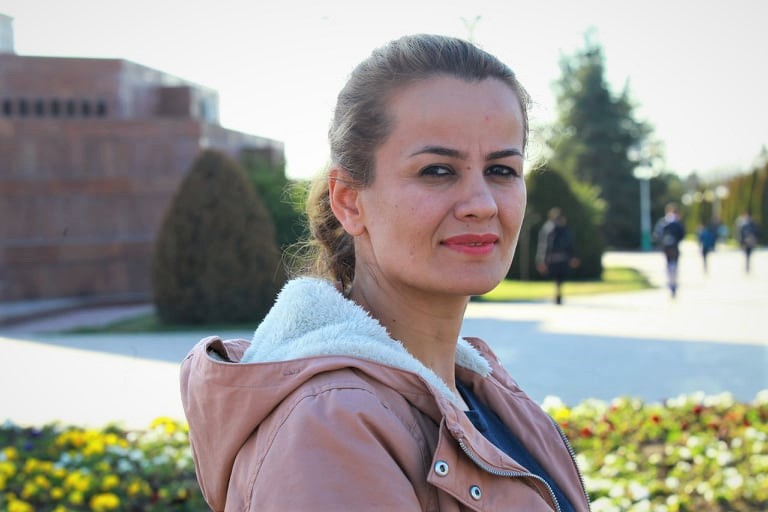In Tajikistan, there is an increase in the proportion of sexual transmission of HIV infection from year to year and an increase in the number of women of reproductive age among those registered with the diagnosis established for the first time. That is why in 2019 the public organization “Tajik network of women living with HIV” (TNW+) with the support of AFEW International in the framework of Bridging the Gaps project conducted a study “Key problems of sexual and reproductive health of women living with HIV in Tajikistan through the prism of human rights”.
Before the International Women’s Day on 8 March, Tahmina Khaydarova, head of TNW+ discussed with AFEW International HIV, sex, violence and gender inequality in Tajikistan.
What does sex mean for men and women in Tajikistan?
For men, sex is an opportunity to satisfy their desire, and only then is it a way of making children. For women, sex is almost always a way of making children and extending the family. As a rule, women in Tajikistan cannot talk about sex and take the initiative in sexual relations, as it is considered to be debauchery.
Generally speaking, the sexuality in Tajikistan is highly exposed to traditional gender stereotypes. It is not common here to discuss sexual relations, either in the family or in society. Some people talk about it with their partners, doctors, etc. But even if they do that that they do not really understand the meaning and significance of the concepts of “sex” and “sexual relations” and most often talk about contraception, methods of protection against unwanted pregnancy, hygiene, etc. But not more.
Does it happen because of national traditions and religion?
Yes, in many ways. However, Islam is a religion of peace and good. Islam does not talk about the abuse of women, but there are other factors that affect women’s lives. These are stereotypes, which can be connected with religion.
One of them is “a woman is obliged to take care of her husband and all members of his family, to be obedient and kind”. Therefore, girls have been brought up in a spirit of obedience since childhood. Women themselves think that men’s interests come first. One of the features of families in the republic, especially in villages, is the predominance of extended families, where several generations of adults and children live in the same house – parents, their adult sons/daughters already married, grandparents, adult sisters or brothers. As a consequence, relatives constantly interfere in the husband and wife relationship.
In the family, girls are taught to be housewives, in most cases have no education, especially in villages, and after marriage the girl becomes very dependent on her partner and family members. Without the permission of her elders and husband, a woman has no right to leave her home and receive information about sexually transmitted diseases (STDs) if she wants. A woman must stand one step behind the man in everything: in decision-making, in expressing her opinion. A woman should listen to her husband’s words, she should keep silence, this is respect. It is also rare for women to be able to decide for themselves when, how and with whom to have sex, how many children to have, etc.
At the same time, sexual violence from an intimate partner increases the risk of HIV infection. During our survey, we heard from the respondents reasoning that non-consensual sexual intercourse is a normal phenomenon, and so it should be in the family, “This is your husband: if he wants to do something then you should obey. He’s young, and that’s why you have to satisfy his desires!”
Inequality between men and women in Tajikistan is developed not only in private life, but also in public life, isn’t it?
Yes, gender inequality is one of the problems hindering sustainable development in Tajikistan. Inequality is everywhere – in access to all types of tangible and intangible resources (property, land, finance, credit, education, etc.); in decision-making in all spheres and participation in political life, and violence against women.
Why do women tolerate violence?
Because it fits within the established system of gender inequality in Tajikistan. Men provide for women, control family relations, and therefore can do, in fact, whatever they want.
But the saddest thing is that society does not sufficiently understand the importance of this problem. It is convinced that domestic violence is a private matter. It is considered that the manifestation of abuse of wife, daughter-in-law, sister, etc. or constant control over their life and behavior is not violence but a norm. At the same time, it is widely believed that a woman is to blame if her husband or his relatives use physical force against her. There are many supporters of this opinion among young people, women themselves, and especially among their mothers-in-law. Therefore, in my opinion, special attention should be drawn to solving the problems of relations between mother-in-law and daughter-in-law, the relationship to the wives of migrant workers during the period when their husbands are outside the country, early and forced marriages, etc.
Are women with HIV more vulnerable?
Definitely! Despite the fact that very often the source of HIV infection for a woman is her husband, she is subjected to violence and discrimination by her husband and his relatives. One woman said that her husband infected her, but did not consider himself guilty. Sometimes he closed the house and left his wife without food, hungry and helpless. One day he even tied her to a pole with a rope and beat her up, and then left for two days. After this she went to her parents, where she was also discriminated.
 Why are women with HIV afraid to visit doctors?
Why are women with HIV afraid to visit doctors?
Practice shows that those who go to the AIDS centre receive quality care and many are happy with it, including me. However, the main challenges for women are when they go to other health care facilities (for surgery or dentists), including primary health care (PHC). In these facilities women living with HIV (WLHIV) are most likely to experience discrimination against themselves. During focus groups, there were a lot of situations when health care workers refused to provide medical assistance to WLHIV and disclosed their status. Most of these cases were in maternity hospitals, dental clinics and during other surgeries. Therefore, most HIV-positive women are afraid to disclose their status and do not seek services from health care institutions, including primary health care services in their place of residence.
Have you talked to these doctors? What do they say about discrimination against people living with HIV?
We haven’t interviewed the health workers. However, many women believe that the reasons are in the lack of preparedness of health workers to work with PLHIV, as well as the low level of knowledge about HIV among staff. One woman, who went to the clinic, told doctors about her status. They immediately refused her services. The woman said it was a violation of her constitutional rights. But doctors said that she was ill and they could not help her anymore. Just imagine – that’s what the doctors said!
Besides in Tajikistan there is not good medical personnel who have experience working with PLHIV. A lot of professionals are leaving our country.
Let’s imagine – a woman found out about her status, she is ready to be examined, receive treatment and do everything that doctors say. Can she face any obstacles even in this case?
An antiretroviral therapy (ART) in our country is bought from the Global Fund, so there are virtually no interruptions. If a person wants to take ART, he or she can get it at all AIDS centers. But according to WHO’s recommendations, people living with HIV are assigned to PHC services and according to these requirements a person has to get the service at home. Due to the fact that in rural areas and small towns and districts everybody practically knows each other, PLHIV are afraid of disclosing their status. So there is a possibility that they will not apply to these services locally for ART services.
How difficult is it for women to accept their status?
More often it depends on their level of awareness and education – they might not know anything about HIV or have distorted information about the virus. Because HIV does not show strong symptoms in the early stages, women think that they are not sick and that the virus does not affect them. Also, accepting a diagnosis depends on a specialist working with the woman, conducting pre-test and post-test counselling.
Do you plan to use the results of your research in future work?
At the moment, the country is developing a “National Program to combat HIV/AIDS epidemic in the Republic of Tajikistan for the period 2021-2025”, and we have joined the working group on ART treatment and prevention of stigma and discrimination against PLHIV. As part of this platform, we are actively promoting the recommendations in our report.
At the same time, the research results helped us to identify and understand a number of issues, which we have not always paid due attention to before. Therefore, we will use this information in our daily work.
You can find the research here.




